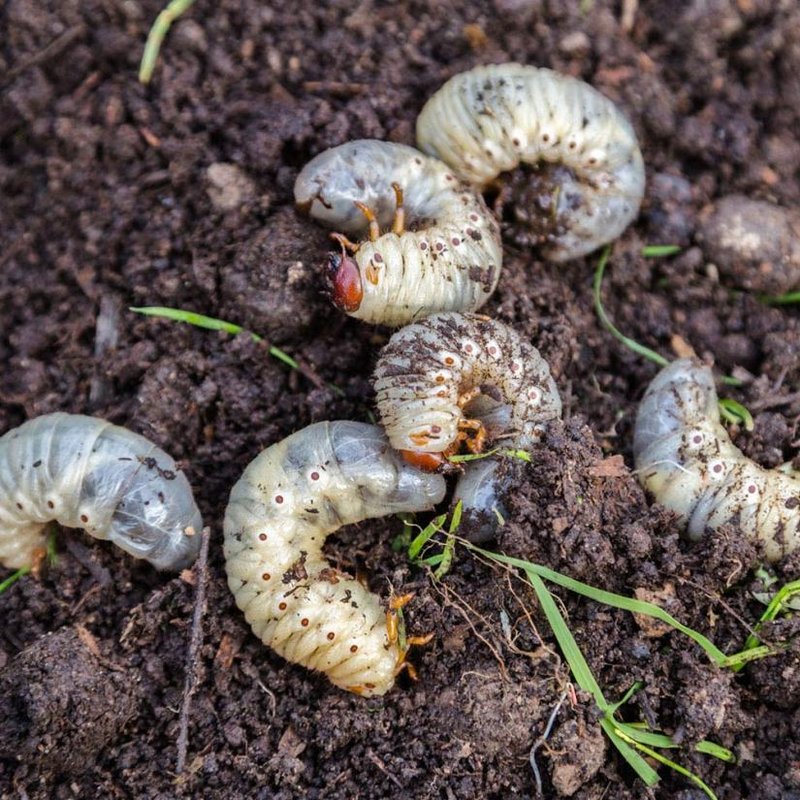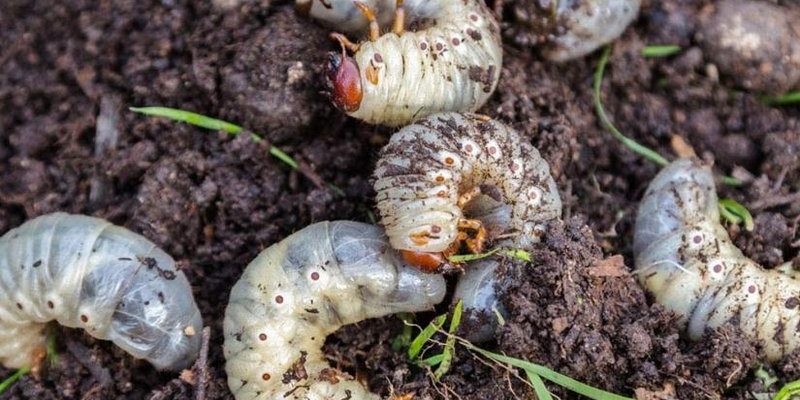
Understanding what attracts grub worms can help you make better choices in your garden. Whether you’re using a high-nitrogen fertilizer to promote lush growth or a more balanced organic option, everything you feed your plants might mysteriously affect whether you end up hosting grub worms. Think of your fertilizer as a beacon that either draws them in or keeps them at bay.
Let’s break down how different fertilizers interact with these garden pests and explore what you can do to keep your plot thriving and grub-free.
What Are Grub Worms?
To understand whether grub worms are attracted to certain fertilizers, we first need to know what they actually are. Grub worms are the larvae of various beetle species, often found in gardens and lawns. You can think of them as the juvenile versions of those pesky Japanese beetles or June bugs you might see around. These worms typically live underground, munching on plant roots and grass.
Here are some common types of grub worms you might encounter:
- Japanese Beetle Larvae
- European Chafer Larvae
- Masked Chafer Larvae
Each type has a different life cycle, but all are hungry little munchers that can wreak havoc if their populations grow unchecked. Their presence often signals that your soil health and plant vitality are at stake, so let’s explore how fertilizers come into play.
How Fertilizers Impact Soil Health
When we think about fertilizers, we usually consider their role in boosting plant growth. However, what many gardeners overlook is how these products influence the overall soil health. Healthy soil can either repel or attract certain pests, including grub worms.
Fertilizers are designed to add essential nutrients to the soil, like nitrogen, phosphorus, and potassium. Each of these nutrients plays a crucial role in plant growth and overall health. Fertilizers high in nitrogen, for instance, can create lush, green foliage. This abundance can attract not just beneficial insects but also pests like grub worms, who find a veritable buffet of roots to feast on.
Moreover, over-fertilizing can lead to nutrient runoff, affecting nearby ecosystems. This imbalance can create a perfect environment for grub worms and others to thrive. So, while you might be trying to nourish your plants, you might also be inadvertently rolling out the red carpet for unwelcome guests.
What Types of Fertilizers Attract Grub Worms?
You might be wondering, “Are there specific fertilizers that grub worms find particularly appealing?” The answer is yes! Generally, fertilizers that are high in **nitrogen** tend to attract these pests more than others. Here’s why:
1. **High Nitrogen Fertilizers**: Products like urea or ammonium sulfate are often packed with nitrogen. While these fertilizers can enhance plant growth, they can also lead to lush, soft roots that grub worms find irresistible.
2. **Organic Fertilizers**: Many organic options, such as compost or manure, can also be appealing to grub worms. They improve soil health but can create a hospitable environment for these larvae if not balanced correctly.
3. **Synthetic vs. Organic**: Both synthetic and organic fertilizers can attract grub worms, but it often depends on how they’re applied. Over-fertilizing, regardless of type, can lead to increased grub populations.
Understanding this can help you make better fertilizer choices that nurture your plants without inviting trouble.
Using Fertilizer Wisely to Prevent Grub Worm Infestations
Now that you know which fertilizers might attract grub worms, it’s time to think strategically about how to use them. Here are some tips to help you keep these garden pests at bay:
1. **Balance Your Fertilizer**: Aim for a balanced fertilizer that provides essential nutrients without being overly rich in nitrogen. A ratio like 10-10-10 (N-P-K) can be beneficial.
2. **Soil Testing**: Conducting a soil test can help you understand what nutrients your garden truly needs, allowing you to apply suitable fertilizers that won’t lead to problems.
3. **Proper Timing**: Applying fertilizer at the right time can reduce the likelihood of attracting grub worms. For instance, apply in early spring or fall when larvae are less active.
4. **Mulching**: Adding organic mulch can improve soil health while preventing grub worms by creating a barrier. Plus, it keeps the soil moist, benefiting your plants.
Following these practices can help create a garden that’s less inviting to grub worms while still nurturing healthy plant life.
What Are the Signs of Grub Worm Infestation?
So, you’ve taken precautions with your fertilizer, but how do you know if you’ve still got a grub problem? Recognizing the signs early can save your garden from severe damage. Here are some things to look for:
– **Discoloration of Grass**: If your grass is turning brown or dying in patches, it could indicate root damage from grubs.
– **Uneven Ground**: As grass dies, it may feel spongy underfoot because the roots are being eaten away.
– **Increased Animal Activity**: Birds, raccoons, or skunks digging in your yard for grubs can signal an infestation.
Catching these signs early means you can take action before the problem escalates.
Natural Solutions to Combat Grub Worms
If you find that grub worms have moved in despite your best efforts, don’t panic! There are several natural methods to help you manage and reduce their populations without relying on harsh chemicals. Here are a few effective strategies:
1. **Beneficial Nematodes**: These microscopic worms are natural predators of grubs. You can apply them to your garden, where they will seek out and destroy grub larvae.
2. **Neem Oil**: This natural pesticide can interrupt the life cycle of grubs. Just mix it with water and spray it on affected areas.
3. **Diatomaceous Earth**: Sprinkling this powder around your garden can help deter pests without harming beneficial insects. It’s like creating a protective barrier.
4. **Regular Lawn Maintenance**: Keeping your grass healthy through regular mowing and aeration can help prevent grub infestations in the first place.
Using these methods can keep your garden healthy while managing grub worms effectively.
Final Thoughts on Fertilizers and Grub Worms
In the dance between your garden’s health and the potential for grub worm invasions, understanding the role of fertilizers can make all the difference. The key takeaway is that while certain fertilizers can attract these pests, using them wisely can help maintain a balance that protects your plants.
By choosing the right fertilizers, timing your applications, and employing natural pest control methods, you can cultivate a thriving garden that stays lush and beautiful—without unwelcome guests. Just remember, gardening is as much about nurturing the soil as it is about nurturing the plants. So choose wisely and happy gardening!

